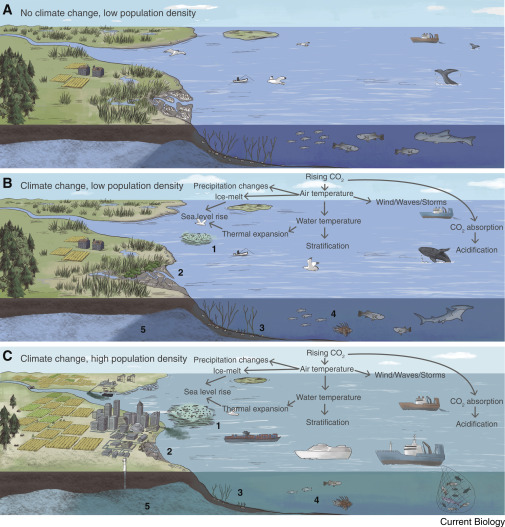How Climate Change Adversely Affects Our Coastal Ecosystems

Photo Credit : Current Biology
Climate change, triggered by human activities, is a significant global crisis that crosses geographical boundaries. One of the most vulnerable ecosystems affected by this change is our coastal areas. The consequences are severe, affecting marine life, biodiversity, and the livelihoods of coastal communities. In this article, we explore the profound impacts of climate change on our coastal ecosystems and discuss potential solutions to mitigate and adapt to these challenges.
As the world deal with the far-reaching consequences of climate change, our coastal ecosystems stand at the frontline of environmental shifts. Rising temperatures, sea level changes, and extreme weather events threaten the delicate balance of life along our coastlines. In this article, we will explore the impacts of climate change on coastal ecosystems and discuss actionable steps we can take to mitigate these effects.
Rising Sea Levels
Coastal areas are experiencing an increase in sea level, a consequence of the meliting polar ice caps and glaciers. This phenomenon poses a direct threat to coastal ecosystems by eroding shorelines, inundating habitats, and altering the delicate balance of coastal flora and fauna.
Ocean Acidification
The absorption of excess carbon dioxide by the oceans leads to acidification, posing a significant threat to marine life. Shell-forming organisms such as corals and molluscs struggle to survive, disrupting the intricate web of life within coastal ecosystems.
Extreme Weather Events
The frequency and intensity of extreme weather events, such as hurricanes and typhoons, are on the rise. These events can cause widespread damage to coastal ecosystems, leading to habitat destruction, loss of biodiversity, and disruptions in the delicate ecological balance.
Loss of Biodiversity
Coastal ecosystems are hotspots of biodiversity, providing essential habitats for numerous species. Climate change contributes to the loss of biodiversity as rising temperatures and changing ocean conditions impact the distribution and abundance of marine life.
Impact on Coastal Communities
Beyond ecological consequences, climate change affects the lives and livelihoods of coastal communities. Fishing industries, tourism, and agriculture are disrupted, leading to economic challenges for those who depend on coastal resources.
Adaptation and Mitigation Strategies
In order to tackle the issues brought about by climate change, it’s crucial to take active steps. Strategies for managing coastal areas, like rehabilitating mangroves and other coastal environments, can aid in lessening the effects. The adoption of sustainable fishing methods and the construction of robust infrastructure are vital measures for adaptation.
Community Engagement and Education
Empowering coastal communities with knowledge about climate change and its impacts is vital. Education and community engagement programs can foster a sense of stewardship, encouraging local communities to actively participate in conservation efforts.
Climate change poses an existential threat to our coastal ecosystems, demanding urgent and coordinated action. By understanding the impacts and adopting sustainable practices, we can work towards safeguarding these critical ecosystems for future generations. Through a combination of global cooperation, community engagement, and technological advancements, we can strive to ensure the resilience and longevity of our invaluable coastal environments.

